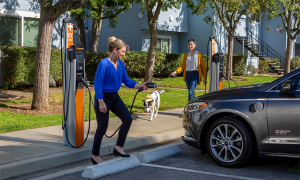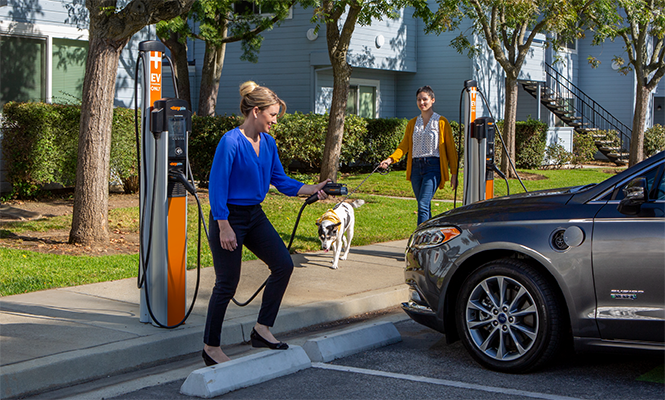Apartment EV Charging Solutions, Costs, and Best Practices
- EV Popularity: As of 2025, the U.S. may have over 5 million electric vehicles, with around 40 million apartment residents.
- Charging Challenges: Tenants rely on inconvenient public charging stations, while property owners face high installation costs.
- Solutions: Tenants can use public stations or advocate for community chargers, while owners can assess needs and partner with professional companies to install stations.
- Cost Range: Each charging station costs approximately $1,500 to $40,000, with government incentives reducing expenses.
- Recommended Brands: ChargePoint, EVBox, and JSOWELL offer reliable charging solutions.
Why Apartment EV Charging Matters
With the rapid rise of electric vehicles (EVs) in the U.S., the demand for convenient charging facilities among apartment residents is growing. Studies suggest that by 2025, over 5 million EVs may be on U.S. roads, while about 40 million people live in apartments. Providing charging stations in apartments not only meets residents’ needs but also boosts property value, attracts eco-conscious tenants, and creates new revenue streams.

Challenges: Tenants and Owners
Tenants’ Charging Struggles
For apartment-dwelling EV owners, charging is a significant challenge. Many rely on public charging stations, which can be far, costly, and time-consuming. Installing personal charging stations often requires property approval, which is difficult to obtain in many apartments.
Owners’ Installation Hurdles
Property managers face multiple obstacles when installing EV charging stations. High costs are a primary concern, with fast-charging station hardware alone potentially costing up to $40,000. Additionally, upgrading electrical infrastructure, such as transformers or distribution panels, adds to expenses. Legal and liability issues, including insurance and compliance, further complicate the process.
Solutions: Meeting Charging Needs
Tenant Charging Options
Tenants can address charging issues through the following methods:
- Public Charging Stations: Apps can help locate nearby stations, though they may be inconvenient, especially during peak times or in remote areas.
- Personal Charging Stations: With property approval, tenants can install chargers in private parking spaces, often covering part of the cost.
- Advocating for Community Chargers: Tenants can team up to request property-wide charging stations. In some regions, like California, laws support tenants funding charger installations.
Owners’ Implementation Steps
Property managers can install charging stations by following these steps:
- Assess Demand: Conduct resident surveys to gauge EV ownership and charging needs.
- Consult Electricians: Discuss electrical system capacity and potential upgrades with professionals.
- Seek Incentives: Research federal, state, or local subsidies to reduce installation costs.
- Partner with Experts: Work with suppliers like ChargePoint for end-to-end support, from design to maintenance.
Costs and Incentives
Cost Range
Installing an EV charging station can cost between $1,500 and $40,000, depending on factors such as:
| Cost Factor | Description | Cost Range (USD) |
|---|---|---|
| Hardware | Level 1, Level 2, or DC fast chargers; fast chargers are more expensive | 500 – 40,000 |
| Installation | Includes wiring and construction, varies by site complexity | 1,000 – 20,000 |
| Infrastructure Upgrades | Electrical system upgrades, such as transformers or panels | 5,000 – 50,000 |
| Software | Subscription fees for billing and management systems | 100 – 1,000/year |
| Soft Costs | Permits, insurance, marketing, etc. | 500 – 5,000 |
Incentives
Government and utility companies offer subsidies to lower installation costs, such as tax credits or direct rebates. Property managers can explore available programs to maximize savings.
Recommended Charging Station Brands
Here are three top charging station brands suitable for apartments:
- ChargePoint: Since 2017, ChargePoint has served 76% of Fortune 50 companies. Its stations support single or dual configurations, with smart billing and remote management, ideal for large apartment communities.
- EVBox: With over 500,000 charging ports, EVBox is compatible with all EV models. Its stations feature 8-inch touchscreens and auto-retracting cables for enhanced user experience.
- JSOWELL: JSOWELL offers cost-effective smart socket solutions with mobile app control and QR code access, perfect for budget-conscious properties.
Success Stories
- Dallas Case: Dallas prioritized equitable charging access for multi-family housing, boosting EV adoption.
- Green Rock Apartments: By installing ChargePoint stations, this property attracted upscale tenants, significantly increasing its value.
- West City Case: Partnering with EVBox, West City Apartments overcame electrical upgrade challenges to provide convenient charging.
Future Trends
As the EV market grows, demand for apartment charging will surge. Experts predict that in the future, every public parking space may include smart charging facilities. Property managers should invest now to stay ahead of the competition.
Conclusion
EV charging stations offer apartments both environmental and economic benefits. By addressing tenant and owner challenges, property managers can boost resident satisfaction, enhance property value, and contribute to sustainability. Now is the ideal time to invest in apartment charging infrastructure to meet 2025 and beyond demands.

